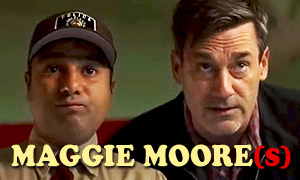How Accurate is "Wicked Little Letters"? The True Story vs. the Film
Olivia Colman
Born: January 30, 1974
Birthplace:
Norwich, Norfolk, England, UK
Edith Swan
Born: 1890
Birthplace: UK
Death: 1959
Bio: Author of the Littlehampton Letters
Jessie Buckley
Born: December 28, 1989
Birthplace:
Killarney, Ireland
Rose Gooding
Born: abt 1893
Birthplace: Lewes, Sussex, England, UK
Bio: Accused of Writing the Littlehampton Letters
Malachi Kirby
Born: September 20, 1989
Birthplace:
England, UK
Bill Gooding
Bio: Rose Gooding's Husband
Anjana Vasan
Born: January 31, 1987
Birthplace:
Chennai, Tamil Nadu, India
Officer Gladys Moss
Born: 1884
Birthplace: UK
Death: 1964, Worthing, Sussex, England, UK
Bio: Investigated the Poison-Pen Case
Gemma Jones
Born: December 4, 1942
Birthplace:
Marylebone, London, England, UK
Mary Ann Swan
Born: 1848
Death: 1923
Bio: Edith Swan's Mother | Renamed Victoria in the Movie
Timothy Spall
Born: February 27, 1957
Birthplace:
Battersea, London, England, UK
Edward Swan
Born: 1846
Death: 1924
Bio: Edith Swan's Father
Were Edith Swan and Rose Gooding next-door neighbors?
Yes. A Wicked Little Letters fact-check confirms that they became next-door neighbors and fast friends when Rose and her husband Bill moved to 45 Western Road in the sleepy Sussex town of Littlehampton in December 1918. The Daily Mail notes that Edith's father, Edward Swan (portrayed by Timothy Spall in the film), gave the Goodings some zucchini that he had grown in his garden. Edith gave Rose her favorite chutney recipe and lent her knitting patterns for socks. To return their kindness, Rose gave Edith a tin bath to borrow. The evolution of their friendship is chronicled in author Christopher Hilliard's book about the case, The Littlehampton Libels: A Miscarriage of Justice and a Mystery about Words in 1920s England.
Was Edith Swan significantly older than Rose Gooding?
No. Despite there being an almost 16-year age difference between actresses Olivia Colman and Jessie Buckley, there was just a three-year age difference between the real-life women, Edith Swan and Rose Gooding. At the time Rose moved to Littlehampton in 1918, she was 25 and Edith was 28.
Did Edith Swan live with her parents?
Yes. She lived with her father, Edward Swan, a retired house painter, and her mother, Mary Ann, a laundress. Mary Ann is renamed Victoria in the Wicked Little Letters movie and is portrayed by Gemma Jones. Edward is played by actor Timothy Spall. According to the 1921 Census, Edith's brothers Stephen and Ernest also lived in the home, which was located at 47 Western Road. Edith had a fiancé named Bert who was in the military serving in Iraq. Like her mother, she listed her profession as "laundress" and indicated that she worked out of her home.
Was Rose Gooding Irish?
No. In researching the Littlehampton Letters Case, we learned that unlike Jessie Buckley's character in the film, the real Rose Gooding wasn't Irish. She was born in Lewes, Sussex, England.
Did Rose Gooding have a child who was born out of wedlock?
The Wicked Little Letters true story confirms that Rose's daughter Dorothy was born in 1909, four years before she married her husband Bill in 1913. Having a child out of wedlock was something that was deeply frowned upon in Britain in the early 1900s. Rose's daughter Dorothy is renamed Nancy in the film and portrayed by Alisha Weir. Rose also had a son named William who was born around 1913.
In real life, Rose Gooding fell under even more scrutiny for the fact that her sister Ruth also had two illegitimate children of her own, Gertrude and William. Ruth and her kids moved into Rose and Bill's small two-bedroom cottage. While living there, Ruth had a third child, Albert, and Rose's husband Bill was suspected of being the father.
Was Rose Gooding married to a black man?
No. As revealed in the Wicked Little Letters cast vs. real people section at the top, the real Rose Gooding was married to a white British man. This isn't to say that mixed-race marriages didn't exist in 1920s Britain. They just weren't a part of the real story behind Wicked Little Letters.
Britain's Migration Museum notes that interracial marriages emerged in seaports around Britain in the early twentieth century. Seamen of all races and nationalities had come from across the British Empire to work and live in the port cities. Some fell in love and thousands of mixed-race children were born. Most notable for interracial marriages was Cardiff's Tiger Bay community.
What was the cause of Edith Swan and Rose Gooding's feud?
The feud between the two neighbors began over the communal garden they shared. Edith and her parents became agitated over the Goodings' overflowing garbage cans, and Rose didn't like the unsavory smell of the rabbits that the Swans kept for meat. On Easter Sunday 1920, Edith overheard an obscenity-laced argument between Rose, her sister Ruth, and Rose's husband Bill. Ruth, who was living with Rose and Bill, had recently given birth to her third child and Rose suspected Bill might be the father. The vulgar language coming from Rose, which was heard by other neighbors as well (one described it as the filthiest language he'd ever heard), was unbecoming for a woman of that era. However, it provided the foundation for Edith's plan to frame Rose as the author of a series of obscene letters.
What triggered Edith Swan to send the first vulgar letter?
A short time after Edith overheard the heated argument between Rose, her sister Ruth, and Rose's husband Bill, Edith filed a report with the National Society for the Prevention of Cruelty to Children (NSPCC), a British child protection charity. Edith claimed that she'd heard Rose beating her sister Ruth's newborn baby, Albert. Officers showed up at the Goodings' home, but they found nothing to indicate that Rose had been abusing the infant. Gossip about the NSPCC visit spread around the community, which prompted Edith to pen the first 'filthy postcard', counting on the fact that Rose would be seen as the most likely author. Edith sent the first poison-pen letter to herself, posing as Rose.
Received by Edith on May 14, 1920, the initial letter began, "You bloody old cow, mind your own business and there would be no rows. – R" Edith showed the letter and others that followed to friends and neighbors. She even signed them with an 'R' or 'R.G' so there'd be little confusion as to who sent them. At times, she'd be as bold to conclude the letter with "Mrs. Gooding's compliments".
Who did Edith Swan send the letters to?
In addition to penning them to herself, Edith, pretending to be her neighbor, Rose Gooding, sent postcards to family members and various members of the wider community in an attempt to turn everyone against Rose. She mailed some to her mother's laundry clients, referring to women as "wh***s" and signing the postcards "from Rose". She mailed others to her brother Ernest's employer, accusing him of stealing.
Did Edith Swan blow up her own engagement in order to further frame Rose Gooding?
In real life, Edith was engaged to a man named Bert, who was serving in the British military in Iraq. Edith, pretending to be Rose, penned a letter to Bert in which she falsely told him that she had gotten pregnant by another man while he was away. The news prompted Bert to call off their engagement.
Did Rose Gooding spend time in prison?
Yes. As local officers avoided pursuing the case, presumably because there was too little evidence, Edith Swan embarked on a private prosecution of Rose, who appeared in front of Littlehampton magistrates in September 1920. She was charged with criminal libel, and due to the fact that her family couldn't afford bail, she spent three months in prison away from her children. Edith made sure not to send letters while Rose was behind bars.
As soon as Rose was released, Edith started sending the letters again, determined to destroy the life of her former friend. Once again, she took Rose to court. Despite Rose's lawyer pointing out that the handwriting on the chutney recipe and knitting instructions that Edith had given Rose matched the handwriting on the wicked Littlehampton letters, Edith denied authoring either the recipe or the instructions and the judge denied the jury's request to see handwriting samples from both women. Rose was found guilty and sentenced to 12 months in prison with hard labor. Though her appeal was dismissed, she was released after just three months due to the fact that Edith's scheme had begun to unravel.
What tipped off police to the fact that Edith Swan was the author of the offensive letters?
While Rose Gooding was behind bars, Edith Swan jotted down obscenities in a notebook. She included a letter along with it and sent it to the police, claiming that she had found the notebook near the Goodings' home. When the police noticed that the accompanying letter had similarities to the handwriting in the notebook, they turned their attention to Edith.
Scotland Yard Inspector George Nicholls examined Rose Gooding's prison correspondence. He noticed that she always misspelled the word 'prison' as 'prision', an error that was never made when the word appeared in the vulgar Littlehampton letters. Inspector Nicholls searched the Western Road homes of both women. In Edith's home, he found several pieces of blotting paper with handwriting that matched the inflammatory letters.
Was policewoman Gladys Moss of Indian descent?
No. A fact-check reveals that, unlike Anjana Vasan's character in the movie, the real Gladys Moss was not of Indian ancestry. She was white British. She held the distinction of being Sussex's first female police officer. She was appointed to the West Sussex Constabulary in 1919. Gladys was also the first motorcycle-riding policewoman in the country.
Woman Police Constable (WPC) Gladys Moss was mentioned in the October 1921 case for the prosecution during the first trial of Edith Swan. Scotland Yard Inspector George Nicholls had asked Gladys Moss to stake out the Swan home from a potting shed nearby. Gladys witnessed Edith toss a piece of paper near the backdoor of neighbor Violet May. The note was addressed to "f****** old w***e May, 49 Western Road". Edith had been caught in the act. Three months later, her trial was held at Lewes Crown Court. The Sussex Express notes that Officer Moss considered the Poison-Pen Case to be the most important case that she worked on.
Was Edith Swan found innocent at her first trial in 1921?
Yes. Despite being caught red-handed when policewoman Gladys Moss watched her throw an offensive note by the backdoor of neighbor Violet May, the judge presiding over Edith Swan's trial, Sir Clement Bailhache, still believed Edith was incapable of the vulgarity displayed in the letters and told the jury, "I would not convict." They listened to the judge's recommendation and found her not guilty. The close call didn't stop Edith from writing more offensive letters.
Was the judge in the Littlehampton Libel Case a black man?
No. According to the real story behind Wicked Little Letters, the judges who presided over the trials surrounding the poison-pen letters were all white men. In fact, it would be decades before a black judge was appointed to the bench in the UK. The man credited as becoming the first black magistrate in the UK is Eric Irons, whose work as a magistrate began in 1962. In 1978, Nigerian-born Tunji Sowande became the first black Deputy Circuit Judge. The first non-white high court judge in the UK was Dame Linda Dobbs, DBE, who was appointed in 2004. The total number of black judges hasn't changed much in the ensuing years. According to Law Society, black judges made up just 1.09% of the judiciary in England and Wales in 2022, a slight rise from 1.02% in 2014.
Did detectives use invisible ink to catch Edith Swan?
Yes. In 1923, three years after the start of the poison-pen letters, and after Rose Gooding had been wrongfully convicted and served time in prison for the crime, detectives came up with a plan to prove that Edith was the culprit. They marked a set of postage stamps with invisible ink and told the post office to only sell them to Ms. Edith Swan. The following June, Edith was at it again when she wrote a nasty and belligerent letter addressed to the town's sanitary inspector, Charles Gardner. Officers observed her inserting it into the letter box. They immediately retrieved the letter and used chemicals to reveal the invisible ink on the stamp. They had enough evidence to convict Edith Swan. She was found guilty and sentenced to 12 months in prison.
Was Rose Gooding compensated for being wrongly accused and convicted of libel?
Yes. As a result of Rose Gooding's wrongful conviction, she was awarded £250 in compensation, which was the equivalent of approximately $962 US dollars or $15,000 today (adjusted for inflation). The press branded her prosecution a "miscarriage of justice".
According to the 1939 Register, Rose and her husband Bill were still living in Littlehampton where the events unfolded almost two decades prior. I imagine they started to follow the mantra of my own mother. "I never get too friendly with the neighbors," she'd say. "If things go south, you have to live next door to them."
Was Edith Swan suffering from a mental illness?
While she could have simply wanted to punish the neighbor she was having a feud with by framing her for writing the poison-pen letters, some have speculated that Edith Swan may have been afflicted with a psychological condition. We do know that by 1939, Edith was living in an institution in Worthing. Therefore, there may be some truth to the speculation that she wasn't in her right mind when she penned the offensive Littlehampton letters.







